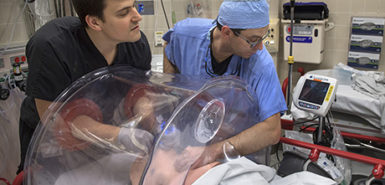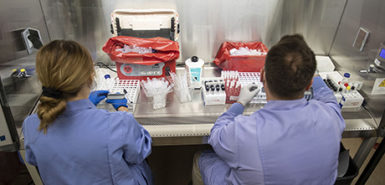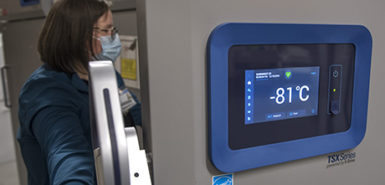
Since COVID-19 became a global pandemic, the worldwide medical and scientific community has worked around the clock to determine the best treatment options and learn more about this new kind of coronavirus.
Medical discoveries have been abundant. As are questions.
A group of Spectrum Health clinical experts seek to provide the most up-to-date answers available. They include Josh Kooistra, DO, senior vice president and chief medical officer, Russell Lampen, DO, an infectious disease specialist, Stephen Fitch, MD, a pulmonologist and medical director of medical critical care, and Daliya Khuon, MD, an infectious disease specialist at Helen DeVos Children’s Hospital.
They constantly review the latest news, research and best practices on COVID-19 from sources such as the Centers for Disease Control and Prevention, the U.S. Food and Drug Administration and the Michigan Department of Health and Human Services.
Q: How is COVID-19 different from the flu and the common cold?
The common cold is caused by different strains of coronavirus than the strain causing COVID-19. It is also a markedly different virus than the one that causes seasonal flu. COVID-19 spreads faster and easier than influenza and can be more severe and deadly than influenza or the common cold. Most coronavirus infections cause similar types of respiratory illness at the onset. People with COVID-19 may have mild symptoms and sometimes progress to high fever, difficulty breathing, persistent chest pain and even pneumonia. Because initial symptoms of COVID-19 are often similar to those of cold and flu, diagnostic tests can help determine if a person has COVID-19. There are some indications of long-term complications from COVID-19, even in people who have mild symptoms.
Q: Who is at higher risk for getting very sick from COVID-19?
Individuals of all ages are at risk for infection and severe disease. People at higher risk include those who are age 65 and older; have underlying health conditions such as heart or lung disease, diabetes and obesity; or have weakened immune systems. The CDC has a comprehensive list of people at higher risk.
Q: How deadly is COVID-19?
COVID-19 is deadly with wide variation in fatality rates. Most people who develop COVID-19 will recover. However, there remains a significant risk of severe harm and death from this illness. Older people and those with underlying medical conditions are more likely to die from COVID-19. In the US, we have seen a higher number of deaths in our Black and Latinx communities than would be expected based on population.
Q: Do masks really work?
COVID-19 spreads easily from coughs, sneezes or even talking closely with others. Masks block the respiratory droplets that contain virus particles and may help people who have COVID-19 from spreading the virus to others. The spread of COVID-19 can be reduced when masks are used along with other preventive measures, including social distancing, frequent handwashing, and cleaning and disinfecting frequently touched surfaces. To be most effective, the mask should fit properly and cover both the nose and mouth. (Note: Bandanas and gaiters have been shown to be less effective than other forms of face masks due to differences in material.)
Q: When will there be a COVID-19 vaccine, and will Spectrum Health support it?
Experts at the Michigan Department of Health and Human Services expect to have more information about a possible vaccine in late fall 2020 or early winter 2021. Spectrum Health will support a vaccine when scientific evidence indicates it is safe and effective. Spectrum Health will not provide a vaccination that does not have FDA approval.
Q: Is there a correlation of deaths by blood type?
There have been two small research studies into the correlation between blood type and COVID-19 severity, which may indicate that blood type is a factor in how the disease progresses in some people. However, these studies have not been peer reviewed and are not considered reliable scientific evidence at this time. More research is being done to determine the true impact of blood type in COVID-19.
Q: Are the symptoms of COVID-19 different in children than in adults? Are children at a higher or lower risk?
The symptoms of COVID-19 are similar in children and adults. People can get a fever, cough or have a hard time taking deep breaths. Based on available evidence, children do not appear to be at higher risk for COVID-19 than adults. While some children and infants have been sick with COVID-19, adults make up most of the known cases to date. Overall, several large studies suggest the disease appears to be less severe in children than in adults, although there are reports of children with COVID-19 requiring hospitalized care. The CDC is investigating cases of multisystem inflammatory syndrome in children associated with COVID-19.
Q: Can someone spread the COVID-19 virus without being sick?
It is possible for people to spread the virus for about two days before experiencing signs or symptoms and remain contagious for at least 10 days after signs or symptoms first appear. If someone is asymptomatic or their symptoms go away, it is possible to remain contagious for at least 10 days after testing positive for COVID-19.
Q: Do nonsteroidal anti-inflammatory drugs (NSAIDs) worsen the course of disease for people with COVID-19?
The CDC is currently not aware of scientific evidence establishing a link between NSAIDs such as ibuprofen or naproxen and the worsening of COVID-19.
Q: What anti-viral drugs are available to treat COVID-19?
Based on clinical trial data, the antiviral agent remdesivir is recommended and approved by the FDA for the treatment of COVID-19 in hospitalized patients with severe disease. The NIH recommends against the use of chloroquine or hydroxychloroquine for the treatment of COVID-19, except in clinical trial.
Q: Does hydroxychloroquine work to treat COVID-19?
There is much public discussion and some misinformation about the use of hydroxychloroquine as an effective treatment in cases of COVID-19. Given the prevailing data, the FDA and scientific community have determined there is no evidence of benefit from hydroxychloroquine in treating COVID-19, and there may be a chance for harm from its cardiovascular effects. That data includes at least two randomized control trials demonstrating no benefit.
Q: What treatment is offered for hospitalized patients?
Standard hospital care, especially the ICU care delivered to critically ill patients, is the result of decades of study and clinical trial work. Interventions include lung protective ventilation based on acute respiratory distress syndrome protocol, prone position ventilation, ICU liberation principles (progressive mobility, comfortable sedation on the lowest effective dose, breathing trials), proper nutrition and prevention of hospital-acquired conditions. In severe cases of COVID-19, drugs which lower the immune response such as dexamethasone and the antiviral agent remdesivir are recommended and approved by the FDA for the treatment of COVID-19.
Q: Does convalescent plasma therapy work to treat COVID-19?
Spectrum Health was the first health system in Michigan to offer convalescent plasma therapy as a treatment option for COVID-19. Patients who have recovered from COVID-19 and meet the criteria, can donate plasma that will be transfused to critically-ill patients to help boost their immune systems. Small control studies from across the nation, coordinated by the National COVID-19 Convalescent Plasma Project, suggest that convalescent plasma improves outcomes in patients with the COVID-19 virus.
Q: What is the outpatient treatment for COVID-19?
There is no specific treatment at this time so the focus is on care that would typically be provided for respiratory illnesses. People with a confirmed case of COVID-19 should isolate from others, monitor their symptoms closely and follow-up with a physician, or visit the emergency department or call 9-1-1 if symptoms are life-threatening.
Q: Can a person get COVID-19 twice? How long will antibodies show up in COVID-19 antibody testing?
The presence of antibodies shows that someone may have been infected by or exposed to the virus that causes COVID-19. How long antibodies remain present in someone’s system can vary by person. Studies are ongoing regarding antibodies and immunity to COVID-19. According to the CDC, reinfection is unlikely within 90 days, but they are unsure about potential immunity beyond that timeframe.
Q: Why are there two different nasal swab type tests for COVID-19? Is one more accurate than the other?
There are two nasal swab tests, and some parts of the country are using a saliva test. The traditional one with the longer swab requires more training, more personal protective equipment and is more uncomfortable. We continue to perform this test on patients who are symptomatic with fever, cough and shortness of breath. We, like most of the country, have moved to the front of the nose, smaller swab in cases where patients are not symptomatic or have vague symptoms since it is much easier to perform, much more comfortable for the patient and requires less PPE. We have found the difference in accuracy is minimal. We are currently evaluating broader use of the smaller swab test as well as new saliva tests that have been recently approved.
Q: Is the COVID-19 virus getting weaker and causing fewer deaths?
Spectrum Health’s COVID-19 mortality has been quite low from the beginning for our hospitalized patients, compared to national data. For the population as a whole, as we have tested more and have seen many more young people testing positive, the overall mortality rate has declined as well.
Q: Is the COVID-19 virus mutating?
This is being studied and there is a lot of discussion across the world about this. At this point, it is unclear if there are clinically significant mutations that are widespread.

 /a>
/a>
 /a>
/a>
 /a>
/a>
Are you planning to do something for the individuals who had this early on and have yet not been able to get relief from some of the symptoms, like brain fog, difficult breathing and exhaustion, the ones in the media called the “long haulers” Thank you for your thoughts
Hi Ruth, Thank you for your comment and question. It does appear COVID-19 may have longlasting effects on our health. We suggest people seek ongoing care to treat these conditions with the appropriate specialist, as directed by your primary care physician. In many cases, this could mean follow-up visits with a pulmonologist or cardiologist. For those who do not have a primary care provider or specialist, our Find a Doctor may be a great resource: https://findadoctor.spectrumhealth.org/. Best wishes to you.
Last sentence, next-to-last question should read:
“… the overall mortality RATE has declined as well.”